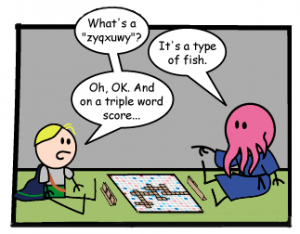Double trouble treble
You’ll get in trouble if you drink a tripel, the strong pale ale brewed by the most hipster of monks, the Trappists.

Tripels have three times the strength (around 8-10% percent ABV) of the standard table beer historically consumed by the monks themselves. This enkel or ‘single’ beer was traditionally not available outside the cloisters, while the duppel (a double strength dark brown beer made with caramelized beet sugar) was sold to provide income for the monastery. Although the term enkel is no longer in common beer parlance (it is on the cusp of a comeback), duppel and tripel have held their ground. It is generally thought that the tripel takes its name from its threefold strength, but it is also sometimes claimed that it is because it has three times the malt of a regular brew. A quadrupel is VERY strong.
As we have seen already in this blog when counting sheep in Slovenian and yams in Ngkolumbu, means for the expression of quantities and multiplication are often linguistically fascinating. Not least the doublet treble and triple, which originate from the same etymological source.
The Latin word triplus ‘threefold, triple’ first entered English via Old French treble. Not satisfied with claiming the space previously occupied by the Old English adjective þrifeald ‘threefold’, it turned up again by the 15th century as the adjective triple.
This triad of modifiers (threefold, treble and triple) exemplify some of the pathways by which lexical synonymy can come about. The first word was formed through a compounding processes (i.e. the numeral three forming a new word with the multiplicative form –fold), the second entered the language through direct borrowing, and the third through a second wave of borrowing (either from Old French triple or Latin triplus).
We don’t just find words competing to express the same meaning, but also parts of words. The –fold element of threefold, tenfold and manifold, and the –plus of triplus, are argued to have developed from the same Proto Indo-European root *pel ‘to fold’. To complicate things even further, the now obsolete treblefold was attested between the 14th and 16th centuries. Words, it seems, like to fight for the same space, and can sometimes be incestuous.
Since entering English over 500 years ago, triple and treble have staked out different paths, but retained similar meanings in at least some of their manifestations, as explored by Catherine Soanes on the OxfordWords blog. In terms of frequency, triple is the stronger twin (or is it a triplet? quadruplet?), ending up triumphant with around 6 times more occurrences in the Oxford English Corpus.

But treble has some resilience. Although the official Scrabble board has double and triple word scores, treble word scores are occasionally referred to on the net (albeit erroneously, or in a devil-may-care way), such as in Charlie Brooker’s article on how to cheat at scrabble. I even found a ‘threefold word score’ on a Scrabble knock-off site. Lawyers to the ready!
This demonstrates that these adjectives really are semantically interchangeable for the most part, even though their distributions are not identical.
The take home? While not not every monastery sells the same tripel, they will all get you drunk.